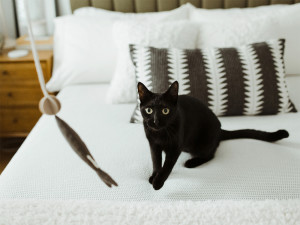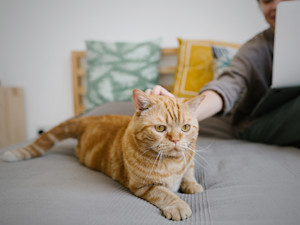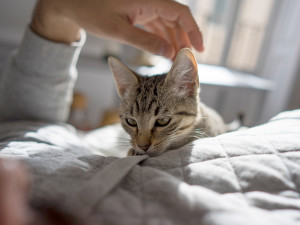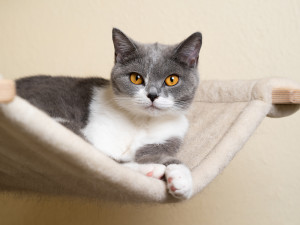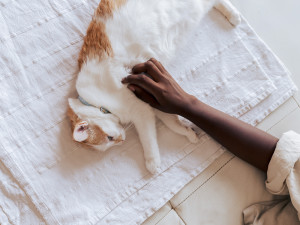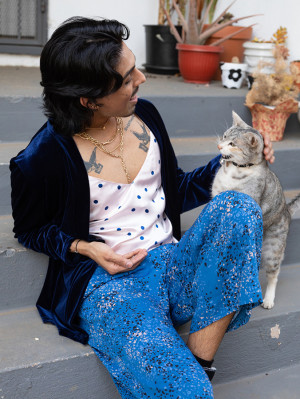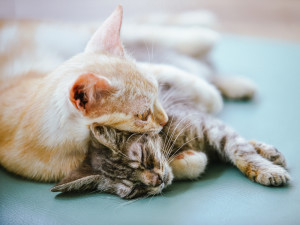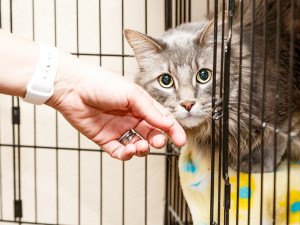Why Do Cats Sleep So Much?
A very sleepy kitty isn’t usually a problem, but watch out for these signs of medical distress.
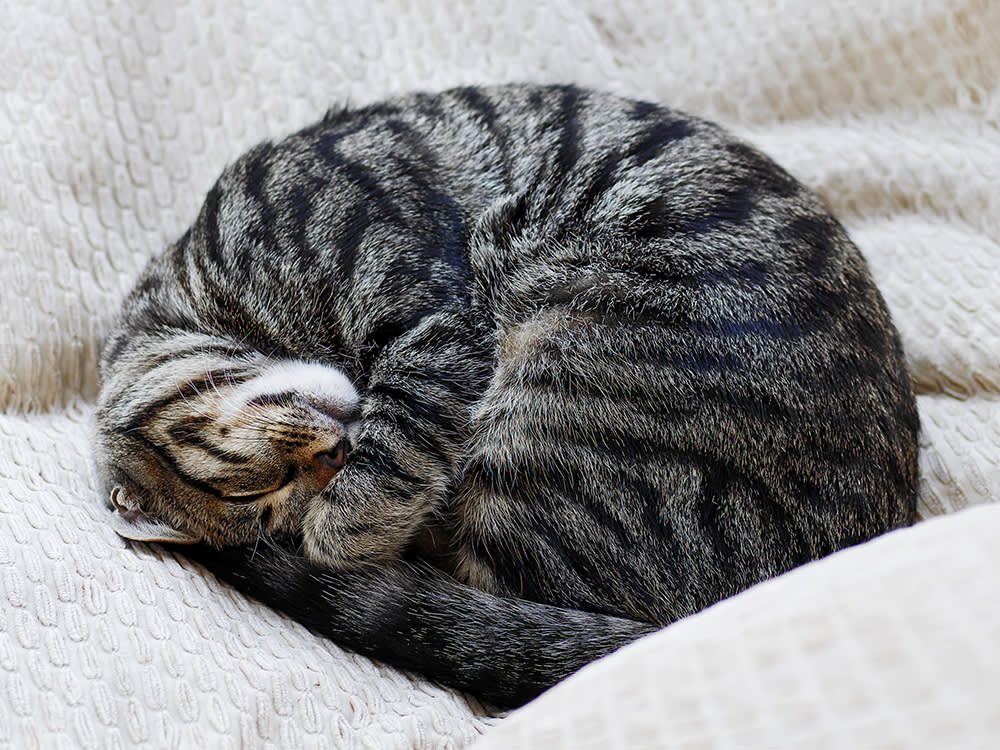
share article
Cats be sleepin’, amiright? But is it possible for them to sleep too much? Also, why do they always have to wake you up so damn early opens in a new tab— howling at the crack of dawn like the house is on fire? Rude! You’d lock them out of the bedroom if it weren’t for the fact that closed doors only seem to make them crazier. So, instead, you drag your begrudgingly awake butt out of bed to feed and water them. And as soon as they’re done eating, before you’ve even finished your first cup of coffee, you see them laying down for their first nap of the day. “Good lord,” you think to yourself, “This has got to be the laziest cat who has ever lived.”
Why do cats sleep so much?
But no, that’s just how cats are, says feline behavior consultant Jennifer Van de Kieftopens in a new tab. “Cats spend 40 to 50 percent of their day sleeping, usually spaced out in short intervals throughout the day, rather than all at once, like we do. It probably has to do with their instinct to hunt and their need to eat often. A cat is designed to hunt an average of 10 mice per day, and they need rest in between hunts.” Although most domesticated cats do little to no hunting, the behavior is still hard-wired into them and their sleeping (and eating) habits are affected accordingly.
So, is there such a thing as too much sleep?
Yes, says Van de Kieft, though exactly what constitutes “too much” depends on the age and temperament of each individual cat. “An adult cat will sleep roughly nine to 12 hours, but a senior catopens in a new tab may sleep more, and a kitten will usually sleep in proportion to the amount of activity they are engaged in.” So, if you’ve got a new kittenopens in a new tab and you need a little peace and quiet, make sure you wear that little fur ball out with lots of play first.
Play with your cat to avoid oversleep.
Playtimeopens in a new tab, it’s worth noting, is essential for cats at all stages of life. It keeps them happy and healthy, and gives them an outlet for their natural hunting instincts. “Often, cats will oversleep because they are bored,” Van de Kieft says. So, it’s important that you keep them stimulated with cat toysopens in a new tab, gamesopens in a new tab, and even another cat or twoopens in a new tab to keep them company (if they’re into that sort of thing).
Is your cat sleeping more than usual?
Too much sleep can sometimes be a sign of medical distress, so make sure you know what’s normal for your cat. That way, you’ll realize when something is off and can respond quickly and effectively. For example, if you notice that your cat is breathing a lot fasteropens in a new tab in deep sleep than they normally do, that could indicate a worsening heart murmur, in which case you should consult your vet right away. Other medical conditions that can cause a cat to sleep more include:
Heart disease
Liver disease
Can you adjust your cat’s sleep schedule?
What you can’t do is train your cat to sleep on the same schedule you do, no matter how much you might want to. Cats are crepuscular creatures, which means they are most active at the beginning and end of the day and tend to lay low the rest of the time — so a cat sleeping all day is pretty normal. If you want to sleep in a bit more in the mornings, make sure you give your cat plenty of attention and exercise right before bed, and try moving their end-of-day meal to later in the evening. You also might want to consider an automatic feederopens in a new tab, at least for their first meal of the day.
It’s also quite difficult to train cats to sleep in a particular spot. “Cats like to change spots,” Van de Kieft says, “So, the best thing to do is provide options and choices for rest spots and let your cat decide what’s best for themselves. They generally like warmthopens in a new tab, so a heated bed might do the trick. They also tend to like sleeping high-upopens in a new tab, so if you’re trying to encourage one into a new bed you’ve bought, place it somewhere off the ground to make it more appealing.” Alternately, if your cat is more of the low-down, hiding-under-the-furniture kind of sleeper, you may want to find them a cave-like bedopens in a new tab or blanket that fits the spot they’ve already chosen for themselves and just make it a little bit cozier.
Or, you know, just leave them to sort themselves out. If there’s one thing cats are great at, it’s turning just about any surface into a bedopens in a new tab. As long as your cat is getting at least 10 naps a day, they’re probably doing just fine.
Frequently Asked Questions
How much do cats sleep in 24 hours?
Cats spend 40 to 50 percent of their day sleeping. An adult cat will sleep roughly nine to 12 hours.
Do cats need more sleep as they age?
Yes; a senior cat will likely sleep more than an adult or kitten cat.
How can I make my cat more active?
Playing is a great way to keep your cat active. Keep them stimulated with cat toysopens in a new tab and gamesopens in a new tab. They may also appreciate a companion catopens in a new tab.
How do cat sleep when they are sick?
If your cat is slow to wake up, hides when they sleep, or breathes heavily while sleeping, they may be sick. A veterinarian can help determine the cause.
When should I be worried my cat is sleeping too much?
You know your cat best; look out for any changes in behavior. If your cat’s sleep seems deeper or your cat is sleeping more than usual, you should see a vet. Cats sleeping all day is a bad sign; cats shouldn’t sleep for more than twenty hours a day.
Why do cats need so much sleep?
Cats evolved to sleep throughout the day so they had enough energy to hunt their prey.
Can environmental factors affect a cat’s sleep patterns?
Yes; stress and big changes, such as a new family member or a big move, can impact the amount of sleep your cat gets.
References:

Charles Manning
Charles Manning is an actor, writer, and fashion/media consultant living in New York City with his two cats, Pumpkin and Bear. Follow him on Instagram @charlesemanningopens in a new tab.
Related articles
![kitten sleeping on top of person]() opens in a new tab
opens in a new tabWhy Does My Cat Sleep on Me?
Not into cuddling? Too bad — they’re spending the night.
![Blue white British shorthair cat resting on a hammock]() opens in a new tab
opens in a new tab7 Cat Hammocks That Make the Perfect Lounge Accessory for Your Kitty
Hang loose, little dudes.
![Unrecognizable woman petting an ill cat]() opens in a new tab
opens in a new tabNow, Something No One Wants to Talk About: Cat Cancer
Veterinarian Dr. Alycia Washington breaks down the four most common types of cancer in cats, from how to spot the early signs to how to treat them.
![Happy stylish latino queer person looking comfortable on porch steps with gray cat.]() opens in a new tab
opens in a new tabCats Lifespan: How Long Do Cats Live? And What to Expect
They are the absolute light of your life. Here’s how you can help them live as close to forever as possible.
![two bonded kittens snuggling]() opens in a new tab
opens in a new tabWhy You Should Adopt a “Less Adoptable” Cat
Here’s why bonded kitties, senior cats, and felines with FIV make just as amazing pets as any other.
![A hand reaching towards a cat peaking out of a cage.]() opens in a new tab
opens in a new tab10 Questions to Ask a Shelter About an Adoptable Cat
From medical history to adoption fees to litter preferences, here is everything you need to know.

